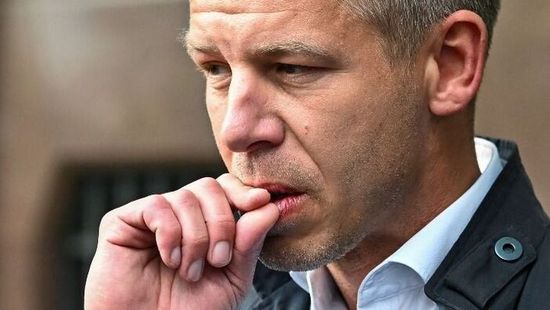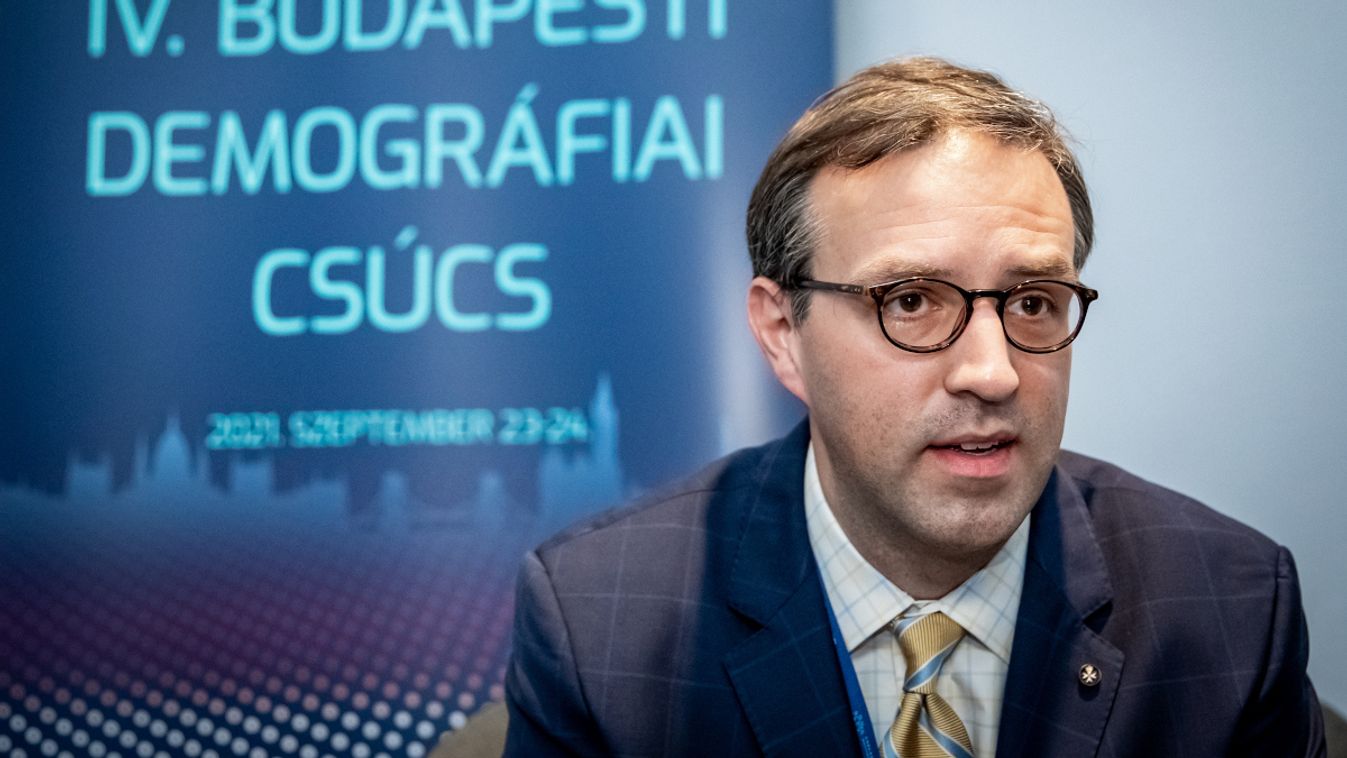Ez is napvilágot látott: Magyar Péter tudhatta, milyen bosszút forralnak Magyarország ellen

A szakértő szerint közölték a Tisza Párt elnökével, mi a feltétele a hivatalban maradásának.

The incoming President of the Hungarian Institute for International Affairs talked to us about Hungarian foreign policy, American-Hungarian relations, as well as ways to ease Hungary’s isolation.

Gladden Pappin will be the next president of the Hungarian Institute for International Affairs. A Hungarian citizen, he was born in St. Louis, Missouri, in 1982. He received three degrees from Harvard University, including his bachelor’s degree as well as a PhD in government. He cofounded American Affairs in 2017, the most prestigious conservative journal of public policy in the United States, as well as the Postliberal Order Substack in 2021. He joined the Mathias Corvinus Collegium in September 2021 as a visiting senior fellow, on leave from the University of Dallas, where he is associate professor of politics.
***

If your average Hungarian looks at the name of the man who’s going to head up the Hungarian Institute for International Affairs, they can’t help noticing that name is, for the first time in history, not Hungarian. What motivations can possibly drive an American to take the top job at some obscure Central European country’s official foreign policy think tank?
For me Hungary is the pivotal country. Long before moving here I supported the Hungarian approach to God, family and nation—particularly articulating Hungary’s family policy as an example for America, and writing in defense of Hungary in the pages of Newsweek and elsewhere. I have long put my efforts toward forging links between American and European conservatives.
My wife’s family goes back many centuries in pre-Trianon northern Hungary, from which they emigrated, and her cousins still live in Slovakia. She and I along with our children are Hungarian citizens.
I first joined the Mathias Corvinus Collegium inspired by passionate belief in Hungary’s importance—particularly its heroic commitment to the defense of the family and Christianity, and its determination to survive and thrive. Since then, I’ve been talking about the Hungarian view everywhere from Tucker Carlson Tonight to academic conferences, seeking to promote the exchange between Hungarian, American and other perspectives. Now presiding over the Hungarian Institute of International Affairs is a responsibility I take very seriously. As Hungarian citizens, my family and I are honored to serve our country in this new way.
What does the Hungarian government and, ultimately, the Hungarian electorate stand to gain from that job being taken by an American?
Connectivity is the name of the game for Hungary: straightforwardly, but without apology, defending the Hungarian perspective and finding the bases on which to cooperate with our allies and partners. Today American conservatives are looking to Hungary, not just vice versa, as it was some years ago. It is also crucial for Hungary to understand how—inter alia—American policymakers think. Having spent twelve years at Harvard University, where I received a PhD in government, I am familiar with American ways of thinking—and the successes as well as grave mistakes in American policy over the last thirty years.
With many Americans looking at Hungary as a beacon of sanity, it’s important that we all think together about the coming global changes. In any event, feedback is extremely important to me, and I look forward to listening to all perspectives on the future of Hungary’s international affairs.
In what ways do you intend to reshape the work of the Hungarian Institute for International Affairs?
The Hungarian Institute for International Affairs is an impressive organization of expertise in countless areas of foreign affairs, from a distinctly Hungarian perspective. Indeed, the Institute’s expertise is going to become even more valuable. The research teams have a wealth of knowledge, and the organizational directors have built a strong operation—I am grateful to be working with such an impressive team.
Today’s rapidly changing geopolitical situation needs Hungarian expertise—and Hungary’s foreign policy analysis also needs to plug into this broader framework. I do not know where the world order will be in ten or twenty years, but I know one thing: classical assumptions about human nature are coming back. We are not simply rootless cosmopolitans without need for home or nation—we are called to defend our children and nurture our families. We will bring these perspectives together to improve our view of the stakes of international relations,
The Institute is going to work directly for the Prime Minister from now on. What kind of input does he expect from you?
Prime Minister Orbán has always said that Hungary cannot survive without understanding the trends around it. Since last year, it has become clear that the post–Cold War liberal world order is breaking apart. Geopolitical blocs are not favorable to countries such as ours, but necessity is the mother of invention, and Hungarians will find a way to survive and thrive! That means, first of all, that the prime minister wants to gather the wealth of perspectives on international affairs within Hungary, as well as increasing our connections with the outside—to identify and harness those opportunities. As president of the Institute for International Affairs, I aim to keep the prime minister fully informed on issues of geostrategic significance, as well as on all other matters of international affairs that come through the institute.
How would you rate the quality of Hungarian foreign policy in thinking and in practice? Where do its key strengths and deficiencies lie?
Hungary’s geographical situation has made its foreign policy realistic and practical. Not to be too mystical, but after many hard centuries, the Carpathian Basin is a region of relative calm, where it is possible to see the shifting winds from Europe to Asia and America. Sometimes there is an understandable tendency to view Hungary as an isolated exception to global trends—but there is more to it than this. When Hungary defends Christian civilization, it draws on the deep wells of natural law and classical political thought that stretch beyond national boundaries. Yet Hungarians should not be too modest! Sometimes people pose a doubt: can Hungary really be an example, given its modest size?
Further, I have nothing but the highest esteem for the Hungarian diplomatic corps and foreign policy teams, who execute their jobs as a model of professionalism.
How can the Institute contribute to tackling the main challenge Hungary faces at the moment—its isolation within the European community?
We cannot have a short-term view about the challenges faced by Hungary within Europe: the fundamentals are on the side of a close integration of Hungary within Europe. For a thousand-year-old country, sufferings can sometimes tempt us to think that we are now at the end of the story. But Hungary is not the last bastion—rather, it is a beacon of sanity to which many other global actors refer, sometimes more often in private than in public. We are not simply a local exception to hostile global liberalism, but a forward-looking example of how conservative Christian commitments produce and undergird a healthy society. At the same time, geopolitical changes have given the European Union a new lease on life; for the continent to survive and thrive, European countries will have to get along—and that means to get along with Hungary, as well.
Relations between the US and Hungary are at their historic low. The US does not see Hungary as worthy of a double taxation avoidance agreement, a treaty that is in force even between the US and Russia. Do you have suggestions for the Hungarian side as for how this key relationship could be repaired?
as I certainly know! Ultimately we must bet on the fundamentals: the ties that bind Hungary and the United States will be stressed at times, but are not fundamentally opposed. The United States and Hungary are not locked in a fundamental resource conflict or essential geopolitical quarrel. And in my opinion, the American people overall share with Hungarians a commitment to the family and Christian civilization. Sadly, Hungary is encountering some headwinds in Washington at the moment. Although the issues involved are complex, we have to seek for cooler heads to prevail in the awareness that mutual cooperation is in the interest of both parties.
The Hungarian Institute for International Affairs is also undergoing a major wave of expansion. What kind of experts are you looking for, and how would you convince them to work for you?
Many experts throughout the world are seeing a new picture emerge, without a single dominant global power. Hungary has a wealth of experience in this area, and it is easy to see things from here. For anyone interested in seeing the new world come into view, Budapest is the place to be and the Hungarian Institute for International Affairs will play a strong role in that. Let’s get to work!
Cover photo: Dávid Mátrai